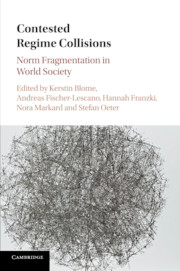Book contents
- Contested Regime Collisions
- Contested Regime Collisions
- Copyright page
- Contents
- Contributors
- Preface
- Contested collisions
- Part I Between collisions and interaction
- Part II Addressing collisions
- 5 Horizontal fundamental rights as conflict of laws rules
- 6 (Dis)Solving constitutional problems
- 7 Governance polycentrism or regulated self-regulation
- 8 Non-financial Reporting for business enterprises
- Part III Collisions otherwise
- Index
- References
7 - Governance polycentrism or regulated self-regulation
Rule systems for human rights impacts of economic activity where national, private, and international regimes collide
from Part II - Addressing collisions
Published online by Cambridge University Press: 05 May 2016
- Contested Regime Collisions
- Contested Regime Collisions
- Copyright page
- Contents
- Contributors
- Preface
- Contested collisions
- Part I Between collisions and interaction
- Part II Addressing collisions
- 5 Horizontal fundamental rights as conflict of laws rules
- 6 (Dis)Solving constitutional problems
- 7 Governance polycentrism or regulated self-regulation
- 8 Non-financial Reporting for business enterprises
- Part III Collisions otherwise
- Index
- References
Information
- Type
- Chapter
- Information
- Contested Regime CollisionsNorm Fragmentation in World Society, pp. 198 - 225Publisher: Cambridge University PressPrint publication year: 2016
References
Accessibility standard: Unknown
Why this information is here
This section outlines the accessibility features of this content - including support for screen readers, full keyboard navigation and high-contrast display options. This may not be relevant for you.Accessibility Information
- 7
- Cited by
